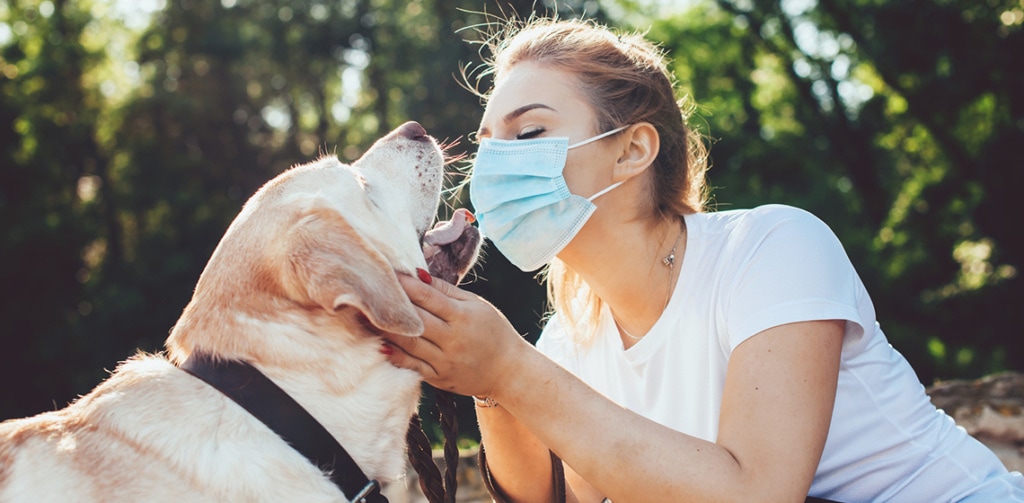At this time of worldwide disruption as the world manages the COVID-19 pandemic, many people are feeling stressed, worried, or confused. Because COVID-19 is a novel virus that we initially knew nothing about, it has seemed at times that public announcements and control measures have been everchanging and sometimes even conflicted. Therefore, making sense of how the virus behaves, what the risks are, and how best to protect ourselves and our loved ones has been difficult.
With so much new and regularly updated information, people understandably have a lot of questions. One of the main questions that I get asked as a vet, relating to COVID-19, is whether pets can be affected. So, can pets get COVID-19? Do they show any symptoms? Could they even die from it? And do they play a role in the spread of the virus? Read on to find out.
Table of Contents
Can pets get COVID-19?
There are viruses from the coronavirus family that affect animals. For example, dogs can get respiratory symptoms from a canine coronavirus, but although this is from the same virus group as COVID-19, it is not the same virus.
That being said, there have been both dogs and cats that have tested positive for COVID-19. However, those who have tested positive have been living in households with people infected with COVID-19. More reassuring is the fact that only a small proportion of pets living in infected households have ended up testing positive, showing that pets don’t easily become infected by COVID-19.
COVID-19 does not seem to pose a serious health risk to dogs and cats. The majority of pet cases that have tested positive for COVID-19 have had no symptoms
But didn’t COVID-19 come from an animal originally?
The exact initial source of COVID-19 has not been determined, but it is thought to have originated in the animal population in China. The most likely origin is thought to be a bat. Despite its likely origin amongst animals, COVID-19 doesn’t seem to adversely affect animals, and they do not seem to have been relevant in the spread of COVID-19.
Can pets get sick from COVID-19?
Whilst cats and dogs have contracted COVID-19 and tested positive, it doesn’t seem to make them particularly sick. The virus appears to cause only mild symptoms or, more commonly, no symptoms at all. Therefore, there is no need to be concerned about any risk to your pet’s health from them contracting COVID-19.
Can pets die from COVID-19?
Luckily, COVID-19 does not seem to pose a serious health risk to dogs and cats. The majority of pet cases that have tested positive for COVID-19 have had no symptoms, with mild symptoms developing only occasionally.
Can pets get COVID-19 from humans?
The recognized cases of pets testing positive for COVID-19 have been from households where the human inhabitants are also infected. This is the case in both cats and dogs so proves that pets can contract the virus from humans. However, the proportion of pets who do test positive is only a very small fraction of the total number of pets living in infected households, and even fewer develop symptoms. This shows that pets do not become infected easily.
Can pets transmit COVID-19 to humans?
Although many studies are ongoing, there isn’t enough information yet to say for sure whether animals can transmit COVID-19 to humans. Some animals appear to be more able to spread the virus within their own species than others. Mink have been suggested as a potential source of infection for humans, and so the risk to people in close contact with mink is slightly higher.
However, in general, animals do not appear to be significant in the spread of COVID-19 to humans, and early studies suggest that pet animals can spread the virus to other animals of the same species, rather than to humans.
Can you get COVID-19 from a pet’s skin or fur?
Whilst current evidence suggests that animals pose only a low risk to humans when it comes to COVID-19, there is potential for them to carry COVID-19, as well as many other germs. Therefore, as always, it is sensible to maintain good hygiene after any contact with your pet, to minimize the risk of picking up any bugs from them.
How can I keep my family and my pets safe from COVID-19?
As well as the current human advice for protecting yourself against COVID-19 like wearing a mask, minimizing close contact with other households, isolating if you have symptoms, and regularly washing or sanitizing your hands, there are some extra tips when it comes to pets.
- As well as minimizing your own contact with other households, where possible try to reduce your pet’s contact with pets and humans from other households. It is important to remember, however, that dogs still need a walk to keep them happy and healthy and some cats will get very stressed if suddenly kept indoors. Therefore, finding a balance between keeping them safe and keeping them happy is crucial.
- If you or a family member are unwell with COVID-19 symptoms, try to stop or limit any contact with them, to reduce the risk of transmitting the virus.
- Always wash or sanitize your hands regularly, especially after contact with your pet and when you arrive home from outside.
- Be aware that vulnerable people like children, elderly people, and those with weakened immune systems are more susceptible to germs so reduce their contact with pets where possible.
- If your pet seems unwell, contact your veterinarian for advice, and let them know if anyone in the household has COVID-19 symptoms or has tested positive.
Summary
Although animals can get COVID-19, the risks of them contracting them from humans are fairly low and they rarely get sick from it. Despite COVID-19 having likely originated from a bat, animals are not thought to play a significant role in the spread of coronavirus. However, even though the risks are low, it is always sensible to follow guidance and maintain good hygiene to keep your family and pets safe.

Dr. Hannah Godfrey MRCVS graduated from the Royal Veterinary College in 2011. Although she initially worked in mixed practice treating all species, she found a love for small animal work and has worked exclusively with dogs and cats since 2014. She lives in Wales with her partner, son, and two cats (named Poppy and Ashton Kutcher), and writes comedy fiction in her spare time.








